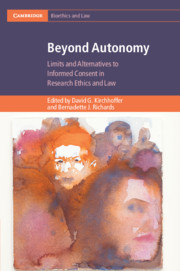Book contents
- Beyond Autonomy
- Cambridge Bioethics and Law
- Beyond Autonomy
- Copyright page
- Contents
- Tables
- Contributors
- Acknowledgements
- Introduction
- Part I Exploring Problems of Respect for Autonomy in Bioethics, Law and Society
- 1 Autonomy and the Law
- 2 Lack of Autonomy
- 3 Diminished Autonomy
- 4 Compromised Autonomy
- Part II The Search for Alternative or Complementary Concepts Surrounding Autonomy
- Part III Beyond Autonomy: Turning to the Community to Protect the Individual
- Index
- Books in the Series
4 - Compromised Autonomy
Social Inequality and Issues of Status and Control
from Part I - Exploring Problems of Respect for Autonomy in Bioethics, Law and Society
Published online by Cambridge University Press: 20 September 2019
- Beyond Autonomy
- Cambridge Bioethics and Law
- Beyond Autonomy
- Copyright page
- Contents
- Tables
- Contributors
- Acknowledgements
- Introduction
- Part I Exploring Problems of Respect for Autonomy in Bioethics, Law and Society
- 1 Autonomy and the Law
- 2 Lack of Autonomy
- 3 Diminished Autonomy
- 4 Compromised Autonomy
- Part II The Search for Alternative or Complementary Concepts Surrounding Autonomy
- Part III Beyond Autonomy: Turning to the Community to Protect the Individual
- Index
- Books in the Series
Summary
One goal of public health campaigns is to reduce health inequalities by encouraging responsible and prudent health choices among groups that exhibit higher rates of disease, especially among groups with low socio-economic status (SES).1 In Australia, examples include Queensland Health’s ‘Deadly Choices’ campaign, which encourages members of the indigenous community to adopt healthy practices,2 as well as the national ‘Quit Now’ campaign to reduce smoking.3 In the United States, there is the Centre for Disease Control’s ‘Verb’ campaign to encourage exercise and activity in at-risk and obese youth.4 At the heart of these campaigns is a conception of the person as an autonomous being who is ultimately responsible for the decisions that impact his or her health.
- Type
- Chapter
- Information
- Beyond AutonomyLimits and Alternatives to Informed Consent in Research Ethics and Law, pp. 63 - 78Publisher: Cambridge University PressPrint publication year: 2019

